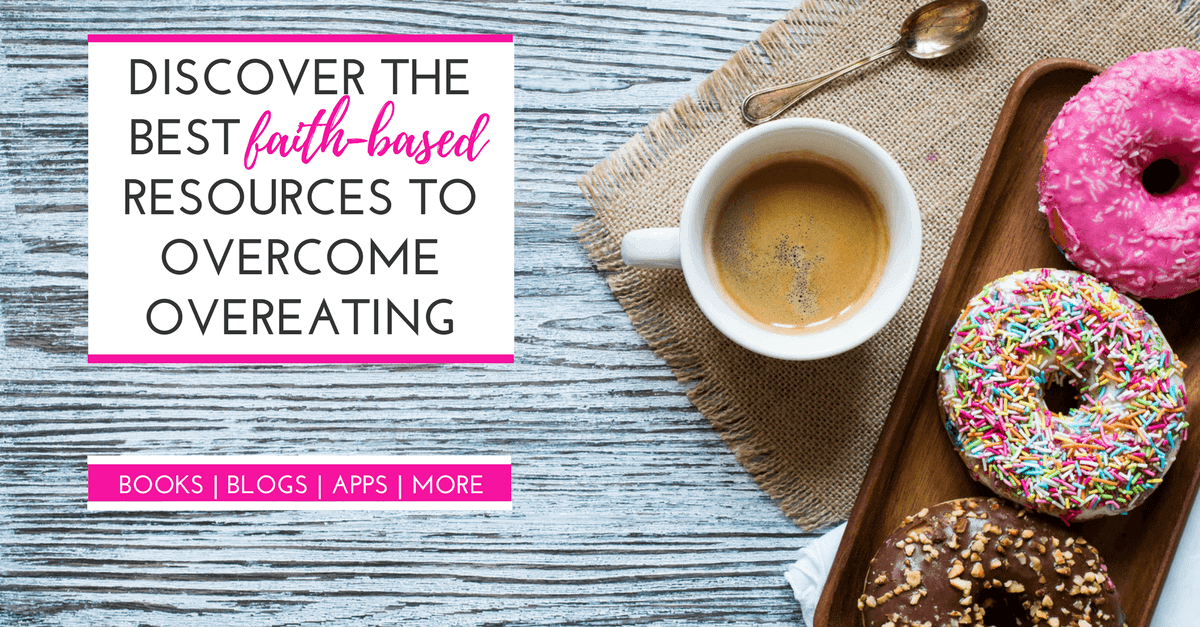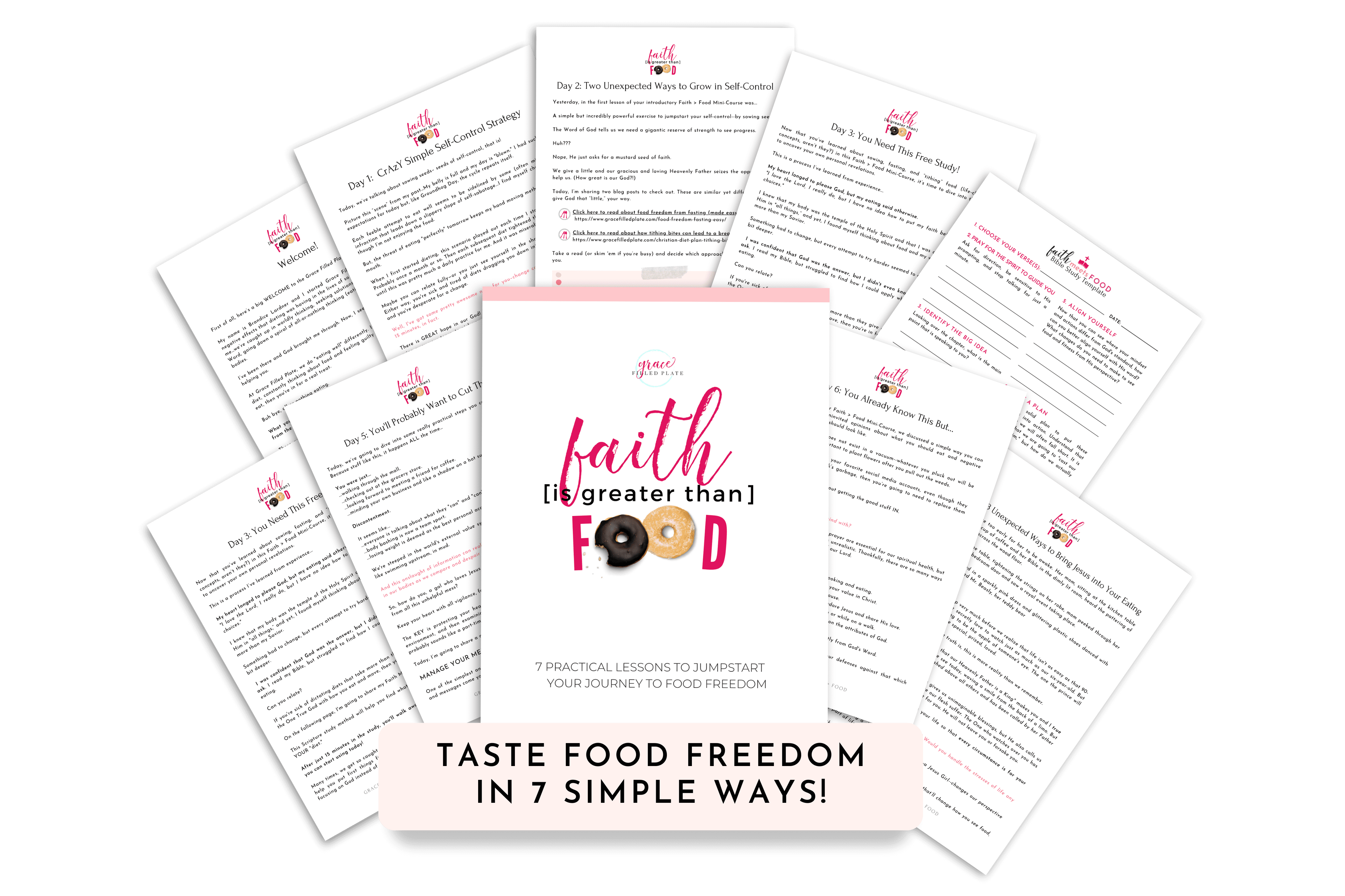It’s a place brimming with feelings of stuckness. A place where you don’t have any clue how to finally stop overeating. I’ve been there. I have gone to bed thousands of times filled with regret over my food choices, only to wake up feeling even a little less hopeful.
But life doesn’t need to look that dreary- there IS hope.
While I cannot promise you a “cure” or a “quick fix,” I can tell you that if you do the suggestions laid out in the post, you’ll see a glimmer of freedom that will propel you to take action. And that, my friend, is where the magic happens!

To use this guide, start at the beginning and slowly work your way down through the recommended resources and linked blog posts (<–they’ll look like this).
You will find some topics that speak to your heart and others that may not apply. No worries, just skim through and stop at those water stations that will fuel your journey as you learn how to stop overeating once and for all.
THE BEGINNING OF OVEREATING
It’s puzzling, isn’t it? Puzzling that you can have such a love/hate relationship with food. Over the years, I’ve worked with hundreds of clients who struggle with how to stop binge eating, emotional eating, and shaving undetectable slivers of cake that lead to eating it ALL.
But, how did we get here? How is it that something so burdensome can be so difficult to stop?
YOUR REASON
For many, overeating began when you were a child. Maybe you grew up in a household where food was scarce and your portions were limited, often leaving you underfed and hungry. Or maybe you grew up in a home that was far from ideal. Life was difficult, possibly even dangerous, and the food was your way of escape.
Others had parents with the best of intentions who didn’t understand what nourishing food was. If your mom and dad fed you primarily out of boxes, bags, and cans, then you were introduced to the science of hyper-palatable food when your brain and body were still developing. It’s a struggle many adults now face.
However, if you are like me, your struggle to stop overeating came as a backlash from fad diets— You under-ate, limited your food portions, and restricted “bad” foods. And when you were “off” the diet, you ate all you missed out and then some.

Seeing where we came from can help us to understand why we eat too much. This way our solutions can be oriented towards what will help us change the most.
Please note, we are not here to make excuses. There is a big difference between reasons and excuses. Excuses keep you stuck. Reasons help you gather your thoughts to move on to an effective solution– and that’s amazing!
No matter where you came from, you can listen to the guilt and get rid of the shame.
WHY WE OVEREAT
Now that you have an idea of why you started overeating, the question begs to be answered, “why do I continue?” While we may begin finding reprieve in food for one purpose, time and repetition can create new habits and “addictions.”
As you survey your daily life and where overeating fits into it, try to do so as a non-judgmental observer. Imagine you were sitting in a movie theater watching your challenge to stop overeating play out in front of you.
Then ask yourself– what happens before, during, and after your binge or over-indulgence?
Pay special attention to:
- The time of day.
- The day of the week.
- Your emotional state.
- What foods you ate or didn’t eat.
- Your self-talk.
- Feeling like you deserve a treat.
- If you had a devotional time that day.
- Your efforts to fight that did or did not help.
Now journal each time you have a difficult moment with food and continue to look for patterns. Is the struggle living in your physical state or is it emotional in nature? Once you can identify a common thread, you can begin to address those triggers one at a time.
DETERMINE A PRACTICAL SOLUTION
Now that you see commonalities in your instances of overeating, it’s time to brainstorm a practical solution. Rest assured, you don’t have to have the perfect plan to see progress. In fact, it will probably take a few times of trying (and failing) to find a great fit.
As with any new skill, it’s time and experience that add up to developing a new way of living. If overindulgence has been a problem for years (or decades, like me), be patient and gracious with yourself as you stop overeating. This will actually HELP your process.
I’d like to pinpoint ONE problem area and try ONE new way to navigate that challenge.

EXAMPLES OF PRACTICAL APPLICATION
- Is there a particular time of day that is challenging? Nighttime binges are super-common. Consider scheduling a few moments to unwind before that difficult hour hits so that you can learn how to stop overeating at night.
- Do you notice that your slips happen the same day each week? If so, change up your schedule or ask for help on that day.
- If stress propels a beeline to the fridge, a focus on reducing stress will be far more effective than fighting the food.
- When overwhelm makes zoning out with food sound extra appealing, consider how you can delegate or manage your anxiety.
- Are imbalanced meals making it harder to say “no” to unneeded food? Plan an energizing and nutritious meal that will fuel you well.
- If negative self-talk is rampant, spend some time brainstorming new thoughts you can use to replace those unwanted, unhelpful ones.
- Do you miss your prayer and devotional time on the days you struggle? Look for ways to prioritize those morning meditations with the Word of God.
Thankfully there are a ton of ways to feel better without overeating. Look for one that excites and invigorates you!
EMBRACE YOUR SPIRITUAL SOLUTIONS
While I do believe that spiritual solutions are far more powerful than practical ones, we touched on simple habits you can change FIRST so you could have a win under your belt. Doesn’t it feel amazing? If you haven’t tried a practical solution yet- do it NOW. You’ll thank me later.
When we try something new, it’s often the novelty that pushes us through the first few days. But, then life hits, and we need some supernatural power to tell our flesh “no”. These are the solutions to help you find true satisfaction and stop overeating once and for all.
When you think of your faith-based action plan, what comes to mind?
1. THE ARMOR OF GOD
The first thing I think of is the Armor of God. These spiritual weapons will get us to a place where we are consistently able to stop overeating:
Truth, righteousness, peace, faith, salvation, and the Word. That is an arsenal fierce enough to slay any foe.
But (and a big but), we need to PUT ON the Armor of God for it to be effective. A helmet in your closet will do nothing to protect your head. Get out your gear, dust it off, and take it to the front lines.
These two posts will help you take action and see God’s weapons fight for you.
- Use the Armor of God to Defeat Overeating, Part 1
- Put on the Armor of God to Defeat Overeating, Part 2

2. OVEREATING BIBLE STUDY
The Bible, the spoken and written Word of God, is our plumb line and resource for life- even for binge eating! While we know of verses that say we should walk in self-control, refrain from gluttony, or not eat an entire pan of brownies for dinner, how do we actually apply those truths?
To help you, I have written 15 Tips from the Bible to Overcome Overeating. This article comes with a FREE Bible Study to help you apply all that you learn in this post. It’s more than head knowledge, it’s how-tos that can change your life.
You may also take these Bible Verses About Overeating through this Weight Loss Bible Study.
You’ll also want to learn how to stop binge eating on your own (with God’s help!).
3. POWERFUL PRAYER
We have not because we ask not. And when we do ask– our motives may not be aligned with God’s Word, so He does us a big favor by saying “no, my love” (James 4:2-3). Fitness can become our flex and weight loss can become an idol. In fact, any good thing can become our little-god thing.
However, when we sync our goals to Our Father’s and meet Him in our prayer closet, our efforts become super-powered. We refocus and strive to pray intentionally about food and fitness to find His purpose in our pursuits!
Prayer time can help us conquer cravings, refocus on the eternal, and get that Holy Spirit pep in our step. Try it and you’ll wonder why you waited so long.
CREATE YOUR PLAN TO STOP OVEREATING
You’ve done some hard work: You peeked into your past to see why you may have started overeating in the first place. Then you observed patterns in your life to see how those old habits have continued to surface in your daily living.
You thought of a few ways to change your environment, your routines, and possibly the way you unconsciously drive through the drive-thru… and you tested one out.
Then we unpacked some spiritual practices that will empower true change. This is getting really exciting!
YOUR NEXT STEPS
Now it is time to determine your concrete action steps. It is time to take those thousand swirling ideas of what you think you “should” and “shouldn’t” do and make sense of them.
Let’s get started!
FIRST, Download your FREE Guide below.
- Acknowledge why you started overeating and allow this knowledge to stir up a grace-filled mindset towards yourself. Avoid using this as an excuse and keep an eye out for how your past affects your daily decisions.
- Pay attention to what drives you towards overeating in your day-to-day life. Narrow down your habits and address ONE that feels either a) the easiest to address for a quick win or b) the most effective so that you can start seeing results right away.
- Intentionally bring your faith into this battle for food freedom! Block out 5-15 minutes a day to dedicate to Bible study and/or prayer specifically about this issue.
- Pull out your calendar and schedule your new habit and spiritual practice. Then find an additional time slot in 1-2 weeks to address how these changes are working for you.
- Practice these habits for 1-2 weeks and evaluate how effective they are for you. Has it been a struggle? No worries, just tweak your approach to the best of your ability. Has it been great? Brainstorm your next steps.
There you have it, your plan to move closer and closer to food freedom. I don’t have to tell you that this won’t be easy but, my friend, IT WILL BE WORTH IT.

